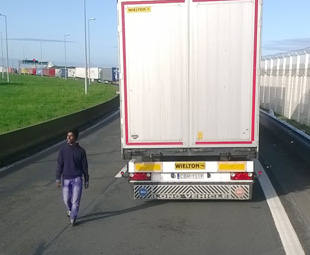Truckers under attack!

The Freight Transport Association (FTA) has reported that European truck drivers are being threatened by organised gangs of migrants, who are throwing stones and trying to get aboard trucks at the port of Calais, France.
FTA members have reported a worsening situation as delays at the Eurotunnel terminal (between Dover, England, and Calais) push trucks towards the ferry port, where migrant numbers have swelled to 6 000.
Truck driver Euan Flemming, from Belfast firm Blair Transport, has been using the Dover-Calais route for 10 years. He says police and security guards were nowhere to be seen in the slow crawl to the port and describes migrants surrounding trucks and dropping from bridges onto the roofs of curtain-sided vehicles.
“The situation improved in August and September but this week it has gone downhill. The migrants have mobilised themselves – it is shockingly bad right now. I’m sitting here in a curtain-sided truck and there are thousands of migrants all around – I might as well roll out the red carpet,” he says.
Frequent invasions of the Eurotunnel compound by migrants in recent days have caused long delays for freight on both sides of the English Channel, with the Traffic Action Plan being put in place in Dover to deal with the huge numbers of queueing lorries.
Donald Armour, FTA’s international affairs manager, says: “FTA is dismayed to learn that for the fourth night in a row migrants have successfully managed to break through the security fencing at the Eurotunnel compound and past the other measures put in place since the summer.
“FTA believes more robust measures need to be taken by the French authorities to keep drivers safe and to ensure that Eurotunnel can function properly, without the dangers and serious disruption our members have had to endure this week.”
Some 500 additional French police are to be deployed in order to strengthen the Tunnel’s defences, but Armour doesn’t think this is sufficient to cope with the relentless nightly attacks.
“We are very concerned that drivers are still being put at risk as they travel through Pas de Calais back to the ports,” Armour concludes.
Published by
Focus on Transport
focusmagsa



